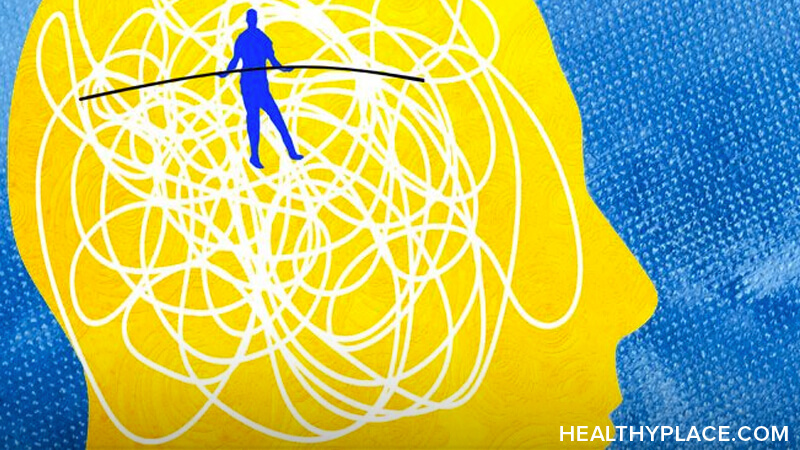Am I Schizophrenic? How Can You Tell?

Am I a schizophrenic? Am I developing schizophrenia? Being concerned about your mental health is a good thing. It can lead to your seeking information and taking action to live well. This concern, though, can become very frightening when you’re experiencing thoughts, feelings, and behaviors that feel like they’re not “normal.” This fear can relate to the symptoms of schizophrenia.
What is Schizophrenia, Anyway?
Schizophrenia is a well-known term. Unfortunately, that’s about all that’s well-known. There is a great deal of misunderstanding and stigma around schizophrenia, and some of the confusion might be making you ask, “Am I schizophrenic?”
Society throws around the word “schizophrenic” when it makes no sense. Casual statements such as these might make you question whether you have schizophrenia when you’re unsure about what you’re experiencing:
- “She’s so psychotic.”
- “He’s out of his mind.”
- “You’re delusional.”
- “Look at him. He’s so schizophrenic.”
These statements can make you question your own sanity. An important thing to question is what these statements mean in relationship to schizophrenia. It’s helpful to know a little bit about schizophrenia.
Schizophrenia is an illness of the brain that involves what is known as positive symptoms, negative symptoms, and cognitive symptoms (Difference Between Positive and Negative Symptoms of Schizophrenia). Together, these include experiences such as:
- Hallucinations (seeing, hearing, feeling, tasting, and/or smelling things that aren’t really there)
- Delusions (false beliefs that the person strongly believes are true)
- Disorganized speech, behavior
- Blunted emotions, lack of motivation, withdrawal
- Memory problems, difficulty with rational thoughts, problem-solving
So if someone accuses you of being psychotic (or “psycho”) for example, check with yourself to see if you are experiencing hallucinations and/or delusions. If you are, you can investigate further. If you’re not, dismiss the person as ignorant.
I Think I’ve Hallucinated. How Do I Know If I Am Becoming Schizophrenic?
This question is what makes this issue complex. If you are experiencing the symptoms of schizophrenia listed above, it’s okay to wonder about them. Early signs of schizophrenia include:
- Withdrawal or even complete isolation
- Mood changes, especially depression-like
- Mild hallucinations (catching movement in your field of vision or hearing something vague)
- Mild delusions (“odd” beliefs that others don’t buy into)
Typically with schizophrenia, the person isn’t aware that she is hallucinating or that her beliefs are delusional. Schizophrenia is so serious and all-encompassing because the person thinks he is fine.
Some people might tell you that if you are asking whether or not you have schizophrenia and wondering if you’ve had hallucinations and delusions, then you’re not becoming schizophrenic. That may be true, but it’s not that simple. People with schizophrenia can have what’s called insight. That means they know that what they think and sense might not be real. But they also think that these things might be real, and telling the difference can be difficult.
Common Questions People Ask Themselves When Considering Schizophrenia
As you work on answering your question, “Am I schizophrenic?” consider asking yourself these common questions:
- Do other people see the things that I’m seeing, hear what I hear, etc.? You can casually ask others to see what they say. That said, schizophrenia makes people withdraw from others, so if that’s happening, pay attention.
- Do I have an explanation for my hallucinations, and what is it? If your answer seems a bit odd to you, or if you share it with someone and they think it doesn’t make sense, this could be a sign of a delusion. For example, if you believe that you’ve been placed here on a special mission and you’re sensing special things because you’re being tested or trained, you are having a delusion.
- Is this just part of being a teenager (if you are, in fact, a teenager)? While the teen years bring challenges and are an intense stage of growth and development, it is not part of adolescence to have the symptoms of schizophrenia (What Are the Schizophrenia Symptoms in Children and Teens?).
If you notice any of the symptoms and signs of schizophrenia, there are things you can do:
- Take an online schizophrenia test. Some call it an “Am I Schizophrenic Test.” These tests ask you about your symptoms and experiences and, while they don’t diagnose you, they can recommend that you see a doctor, depending on your responses.
- If you are aware of your senses and beliefs (if you have insight) but aren’t sure if they’re “normal” or “odd,” pay attention to other people. What are their comments and reactions to your beliefs? You can even directly ask people with whom you are comfortable.
- See a doctor or a therapist. Seeking professional input and help is the best way to treat schizophrenia.
Know yourself, and when that’s hard, let others help. Professional treatment is essential because if you do have schizophrenia, the sooner you begin treatment, the better you’ll respond to it.
APA Reference
Peterson, T.
(2021, December 28). Am I Schizophrenic? How Can You Tell?, HealthyPlace. Retrieved
on 2026, March 3 from https://www.healthyplace.com/thought-disorders/schizophrenia-symptoms/am-i-schizophrenic-how-can-you-tell


